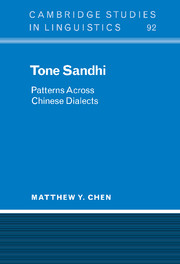Book contents
- Frontmatter
- Contents
- Preface
- Notational conventions
- 1 Setting the stage
- 2 Tonal representation and tonal processes
- 3 Directionality and interacting sandhi processes I
- 4 Directionality and interacting sandhi processes II
- 5 From base tones to sandhi forms: a constraint-based analysis
- 6 From tone to accent
- 7 Stress-foot as sandhi domain I
- 8 Stress-foot as sandhi domain II
- 9 Minimal rhythmic unit as obligatory sandhi domain
- 10 Phonological phrase as a sandhi domain
- 11 From tone to intonation
- Concluding remarks
- Bibliographical appendix Tone sandhi across Chinese dialects
- References
- Subject index
- Author index
Concluding remarks
Published online by Cambridge University Press: 24 October 2009
- Frontmatter
- Contents
- Preface
- Notational conventions
- 1 Setting the stage
- 2 Tonal representation and tonal processes
- 3 Directionality and interacting sandhi processes I
- 4 Directionality and interacting sandhi processes II
- 5 From base tones to sandhi forms: a constraint-based analysis
- 6 From tone to accent
- 7 Stress-foot as sandhi domain I
- 8 Stress-foot as sandhi domain II
- 9 Minimal rhythmic unit as obligatory sandhi domain
- 10 Phonological phrase as a sandhi domain
- 11 From tone to intonation
- Concluding remarks
- Bibliographical appendix Tone sandhi across Chinese dialects
- References
- Subject index
- Author index
Summary
Back in January 1986, at the Conference on Languages and Dialects of China, held in Oakland, California (under the sponsorship of the Wang Institute of Graduate Studies), I presented a paper entitled “An overview of tone sandhi phenomena across the Chinese dialects” (Chen 1991a). Looking back across the distance of a decade, I realize how much the field has advanced on both empirical and theoretical fronts. Our store of empirical knowledge about the range and diversity of tone sandhi phenomena has been enriched enormously by recent dialectological reports. Complementing the breadth of descriptive coverage, I have attempted an in-depth analysis of a number of selected dialects including Beijing, Tianjin, Boshan (Mandarin), Shanghai, Danyang, Nantong, New Chongming, Zhenhai, Wenzhou (Wu), Changting (Hakka), and Xiamen (Min). In many cases the nature of the questions we entertained forced us to dig for new kinds of facts not previously noticed or reported even regarding well-known dialects (e.g. Beijing Mandarin or Xiamen). One of the more startling discoveries is the fact that some Chinese dialects (notably New Chongming) have developed a full-blown syndrome of classic accentual systems, as diagnosed by such standard criteria as culminativity (one tone-bearing syllable per word/unit), leveling (all tonal categories reduced uniformly to a plain H), edgemostness (head-terminal prominence), tonic clash (resolved by either de-toning or tonic shift), and the Weight-to-Accent principle (appropriately extended beyond the traditional distinction between light and heavy syllables).
- Type
- Chapter
- Information
- Tone SandhiPatterns across Chinese Dialects, pp. 504 - 506Publisher: Cambridge University PressPrint publication year: 2000



